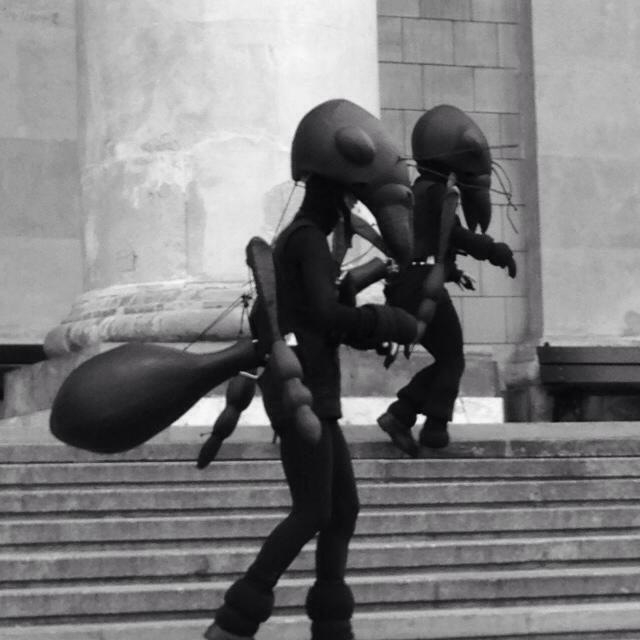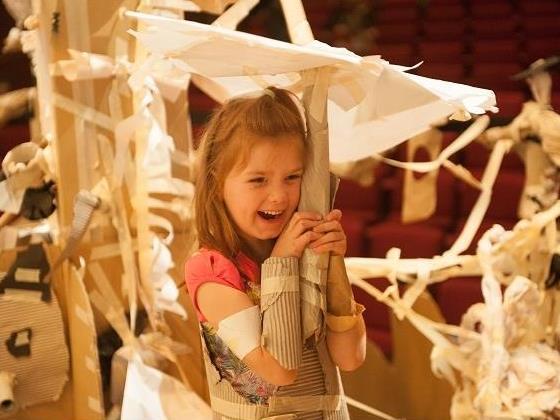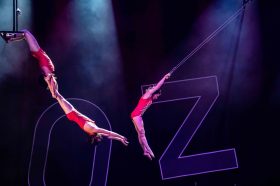Ants and Paper Planet (Photo courtesy of Polyglot)
Warsaw. The Paris of the North – or at least until the Nazis got to it. We’re staying in the Old Town – an extraordinary re-build of the city after it was flattened by bombs in a punitive action after the Warsaw Uprising. This year is the anniversary of the uprising and the streets are lined with photographic memorabilia of that extraordinary time, that is when they’re not lined with 10,000 singing, flag-waving fans of the local football team who just won the Polish league.
I’m here to take part in the General Assembly of ASSITEJ – a French acronym meaning association of theatre for children and young people. This is the global peak body for theatre for young audiences and involves over 30 countries in a four-day congress and a week of festival with shows, symposia, workshops and networking opportunities at receptions held by different countries.
I’d been a board member of YPAA (Young People and the Arts, Australia – the Australian ASSITEJ national centre) back in 2004 for a couple of years and have recently re-joined the board as international representative. This means that I’m here to stand for election to the Executive Committee, a position which will allow me to work for the greater profile, value and standing of the theatre for young audience sector world-wide, with obvious implications in Australia.
Polyglot is here with two hats on – my candidacy for the Executive Committee and the presentation of our work Ants. With the tour is Tamara Harrison Executive Producer of Polyglot and Ian Pidd, who is performance director for Ants. We’re working with three Polish performers that we have never met before – an experiment in process that has been partly dictated by available funds and partly by a desire to explore different touring models, responding to environmental sustainability and cultural exchange as much as affordable market prices.
The ASSITEJ Congress is at the Palace of Culture and Science – a significant building for many reasons. It was a gift from the Soviet Union after the war and is the tallest building in Warsaw. A gothic construction of awe–inspiring dimensions with countless rooms full of yellow marble, chandeliers, ceiling frescoes and parquet flooring. It seems to be teeming with people who disappear into the millions of rooms to do mysterious things, and the acoustic is simply appalling.
In this extraordinary place, we meet, sitting at long lines of tables, with translation headphones like the UN – in three languages: Polish, Spanish and English. We have electronic voting mechanisms and an agenda led by our inspiring President Yvette Hardie of South Africa.
Our greetings to each other in the corridors are “Good morning Israel” “How are you Ireland?” “Are going to drinks China?” and of course we try to learn each other’s names as well. The English speakers are at a distinct advantage as English is the official language of the association. At every congress there are two languages apart for English used in translation – the language of the country we are in – this time Polish – and Spanish.
I’m with Noel Jordan who has held a position on the Executive for 6 years and who is standing down in this round of elections. I must make a speech to the general assembly, lobby for support, meet and speak and greet and understand how the association operates and takes action.
It is a fascinating forum. Every conversation is illuminating and every person there is an artist, not only passionate about the form and the audience they work for and with but with great influence within their own countries. There is much to compare and contrast – political situations in countries that don’t allow for the free exploration of the theatre arts, traditions that hold back contemporary experimentation, issues around developing nations and the resources supporting arts for young audiences, Eurocentric theatre and over representation in particular areas, research and feedback, issues around quality, inclusion, professionalism and definitions.
The theme for this Congress is Facing the Audience – the third in a dramaturgy of themes across three years since the last Congress in Sweden and Denmark. Two of the very interesting days were spent in Open Space discussion run by Paul Harman, who ran Open Space for the first ever Australian Theatre Forum and Artistic Encounters where delegates discussed several blanket statements such as Children Are The Most Demanding Audience or Theatre for Young Audiences Should Not Be Political. Also a great discussion around feedback, methodology and a session with 10 young people between the ages of 15 and 18 who told us what they wanted from theatre. We have seen performances from Israel, Japan, Poland, UK, Africa, Denmark, Sweden, Canada, Italy and Australia. We’ve had presentations from associated networks and reports from past projects.

Ants and Paper Planet (Photo courtesy of Polyglot)
To have so many Australians here was fantastic. Our willingness to travel is pretty impressive. The official voting delegation was Noel Jordan , myself and Alex Walker of St Martin’s Youth Theatre, but other delegates were Katrine Gabb from St Martins Youth Theatre who were presenting workshops and symposia around inclusive arts practice, Tamara Harrison and Ian Pidd from Polyglot, Sam Routledge from Terrapin Theatre in Tasmania, Mark Radvan from Imaginary Theater in Brisbane and Thom Browning, who was here as a Next Generation participant, playwright Dan Giovannoni and Director Luke Kerridge.
On Day 3 the voting commenced for the Executive Committee – one candidate at a time. The tension was exciting and the results were posted in order of highest vote to lowest, just like a beauty pageant. Anyone under 80 votes did not get in. I’m happy to say I was voted in, and am now a member of the Executive Committee of ASSITEJ International; which means the work now begins. Being part of this association, with its reach, ambition and vision is a real privilege and opportunity – to learn and expand, to contribute and to make the connections between our own situation in Australia and others’.
But without the heartfelt speeches, what does this really mean? ASSITEJ is a real, working organisation that collects and supports research that creates real projects, that publishes articles and forges links, that supports growing centres in countries developing their arts practice for children and young people and that is genuinely passionate about working in new ways.
And why is this important? The arts industry sector that works in performing arts for children and young people has taken a blow in recent years; not only in Australia, where we saw the de-funding of many of our companies and organisations, including our own national centre YPAA , but as a general wave across the world; when budgets are cut, the first to go is the arts.
This impacts on the possibilities of a creative, imaginative society, at a time when the changes across the world mean creative response is vital. It impacts on the kinds of choices people make, from an early age, about what is important. It takes away the opportunity to give a voice to a particular demographic in our society and to enable the contributions they make to be heard and seen. It creates division and ignores ability. It makes us more risk adverse, less adventurous, less accessible.
The small to medium sector in Australia – which is the very sector most, if not all children’s and young people’s theatre companies sit, is the most productive, most transparent, most inventive, most widely travelled, most representational sector of all. We bring arts to hugely diverse communities, we are the most experimental in form, content and audience, we work with thousands of artists, we work for all ages, we bring millions to the economy, we are lean machines, we work very, very hard. This sector is the least valued, the one with the most demands placed upon it, the one that has the fewest resources and the one that is the most under attack. No matter how often we prove ourselves; artistically, academically, economically, culturally, socially – on a national and global level those who make decisions remain apparently ignorant to the achievements of this sector.
This Congress and this Association of ASSITEJ and its national centres, like YPAA in Australia, has the capacity to work for the profile of the performing arts for children and young people worldwide. The social bridging results of our combined practice are undeniable and our combined artistic contribution is inspiring.
The Congress and Festival are drawing to a close as I write. This is the last day. Ants is drawing children into a collective landscape shifting exercise across the imposing steps of the Palace of Culture and Science, delegates are trudging across the pavement with bags and the new Executive Committee are talking already about plans for 2017. One more Gala, and it’s over. It’s been a week of conversation, exchange, drinking and parties, performance every day, workshops and discussion, alliances and presentations. Cards have been handed over, DVDs tucked into luggage and everyone is buying vodka.
I’m heading into new territory, with a group of 15 people from 15 different countries, who make the world seem full of things more similar than different.
ASSITEJ website http://www.assitej-international.org





